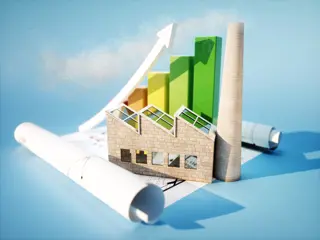Industrial vs. Residential Investments in Vadodara: A Strategic Comparison
 Vadodara’s real estate scene offers a distinct mix, acting as both a hub for industrial activity and a growing residential market. With the Delhi-Mumbai Industrial Corridor (DMIC) and expanding infrastructure, investors need to consider different opportunities. Here, we look at the ROI potential, growth sectors, and strategic choices for industrial versus residential investments in Gujarat’s industrial heartland.
Vadodara’s real estate scene offers a distinct mix, acting as both a hub for industrial activity and a growing residential market. With the Delhi-Mumbai Industrial Corridor (DMIC) and expanding infrastructure, investors need to consider different opportunities. Here, we look at the ROI potential, growth sectors, and strategic choices for industrial versus residential investments in Gujarat’s industrial heartland.
Industrial Investment: Warehouses, Logistics Hubs, and Manufacturing Hubs
Key Growth Sectors
- Chemical and Pharmaceuticals: Traditional strongholds driving demand for specialized storage solutions
- Automotive and Engineering: Expanding supply chains require warehousing near industrial clusters
- Cross-Modal Logistics: Vadodara’s strategic location between Mumbai and Ahmedabad spurs logistics investments
High-Yield Industrial Properties
- Makarpura GIDC: Established industrial ecosystem with road/rail connectivity
- Suncity Industrial Park: Customizable plots in emerging industrial corridors
- Halol and Manjusar GIDs: Thriving automotive and engineering clusters
Advantages • High occupancy rates due to local manufacturing dominance • Stable rental income (often tied to long-term industrial leases) • Growth potential linked to infrastructure upgrades (e.g., Vadodara-Mumbai Expressway)
Residential Investment: Affordable Market With Urbanizing Peripheries
Promising Residential Hotspots
- Gorwa: Adjacent to industrial corridors with high rental yields (8.1%) and mixed-use development potential
- Sama and Old Padra Road: Leading residential growth areas with 35%+ price appreciation over five years
- Pratap Nagar and Akota: Established commercial-residential hybrids
Emerging Opportunities
- Integrated Townships: Alembic City and similar projects blending residential/commercial spaces
- Affordable Housing: Government schemes and lower entry points attract first-time buyers
- Smart City Initiatives: Improved urban amenities enhancing livability
ROI Comparison: Industrial vs. Residential
| Factor | Industrial | Residential |
|---|---|---|
| Typical ROI | 8-12% (leasing) | 8-10% (appreciation) |
| Capex Requirements | High (warehouses) | Lower (residential plots) |
| Growth Catalyst | DMIC/expressway projects | Infrastructure upgrades |
| Risk Profile | Moderate (lease dependency) | Lower (diversified demand) |
| Time Horizon | Long-term leases | Shorter-term flips |
Economic Drivers Fueling Both Sectors
- Manufacturing Momentum:
- Vadodara’s chemical, pharmaceutical, and automotive industries are thriving
- Draws ancillary services gravitating toward industrial clusters
- Infrastructure Surge:
- DMIC and Vadodara-Mumbai Expressway boosting connectivity
- Smart City initiatives improving urban living standards
- Demographic Shifts:
- Young professionals seeking affordable housing near industrial hubs
- New job opportunities arise near IT hubs, attracting both students and professionals for relocating
Strategic Considerations
For Industrial Investors
- Prioritize properties near inter-city rail/road networks
- Align with sectors experiencing DMIC-driven growth
- Explore zoning regulations and development incentives
For Residential Buyers
- Target peripheral areas with infrastructure development pipelines
- Affordable homes with proximity to employment centers
- Monitor RERA-compliant projects for legal security
Future Outlook
The DMIC and Vadodara’s designation as a Smart City promise sustained growth. Industrial real estate will likely maintain steady demand, while residential markets capitalize on urban expansion and infrastructure upgrades. Investors should align portfolios with sector-specific risk appetites, leveraging Vadodara’s unique position as both an industrial powerhouse and an emerging urban center.